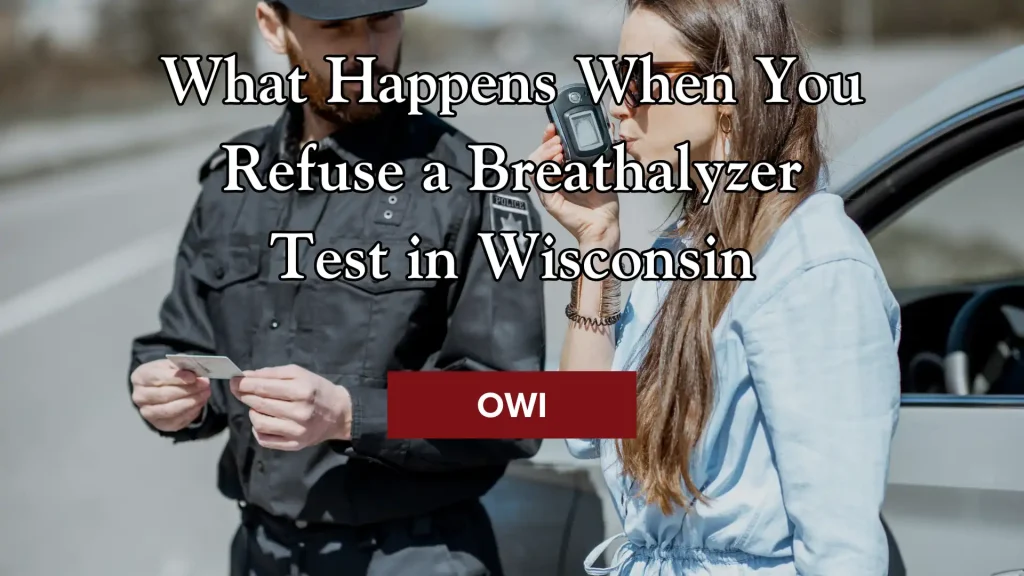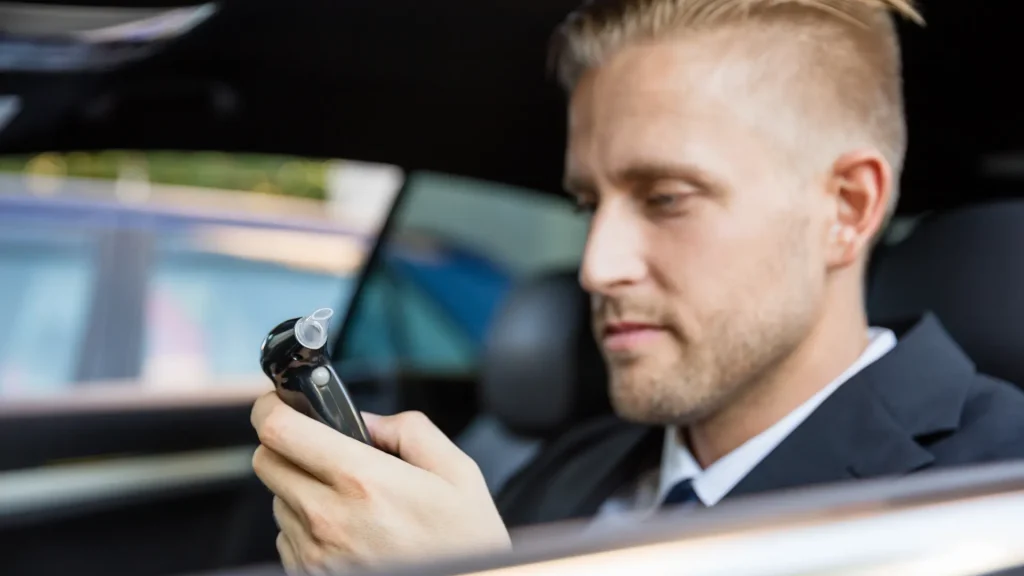 It is illegal to operate a motor vehicle in Wisconsin with a Blood/Breath Alcohol Concentration (BAC) of 0.08 or greater. If a law enforcement police officer has reason to believe you are Operating While Intoxicated (OWI), they can request samples of your breath, blood, or urine. If you refuse to take a breathalyzer test, you may face fines, loss of your license, and other criminal penalties. The prosecution may also use the refusal of a BAC test against you in court.
It is illegal to operate a motor vehicle in Wisconsin with a Blood/Breath Alcohol Concentration (BAC) of 0.08 or greater. If a law enforcement police officer has reason to believe you are Operating While Intoxicated (OWI), they can request samples of your breath, blood, or urine. If you refuse to take a breathalyzer test, you may face fines, loss of your license, and other criminal penalties. The prosecution may also use the refusal of a BAC test against you in court.
Drunk driving is a serious offense that can upend your life. Hart Powell, S.C. can tell you more about the potential consequences of refusing a DUI test, defend you, and help you avoid an OWI charge.
Understanding Wisconsin’s Implied Consent Law
Wisconsin’s implied consent law states that any person who operates a motor vehicle on a public roadway is deemed to have consented to a sobriety test. Law enforcement may ask for and conduct the test before or upon a suspect’s arrest.
There are exceptions to the law. For example, in 2021, the Wisconsin Supreme Court ruled that implied consent does not apply to blood tests administered to incapacitated drivers. The court determined that performing such a test without a warrant is unconstitutional. They noted that it does not fulfill any recognized exception to the warrant requirement. As such, the Court ruled that administering a blood test this way violates the Fourth Amendment.
Can You Refuse a Breathalyzer in Wisconsin?
Refusing a breathalyzer test in Wisconsin is within your rights during a DUI stop. However, refusing a field sobriety test or a chemical test can result in criminal penalties and the loss of your driver’s license. Refusal can also be used against you in court and viewed as an admission of guilt.
What to Expect After a Refusal
If you refuse a DUI stop breathalyzer test, you should expect to be arrested and face legal charges. You should also be prepared for immediate vehicle impoundment for refusal.
According to the Wisconsin Department of Transportation (DOT), breath test refusal penalties may include:
- First or second offense with no prior OWIs – If it is your first time being charged with chemical test refusal, you can lose your license for one year. You may also have an ignition interlock device (IID) installed on your vehicle. Or, the court could order you to participate in a 24/7 sobriety monitoring program. Penalties are the same for a second BAC test denial charge, as long as you have not had any OWIs in the previous 10 years.
- Second offense with prior OWIs – A second breathalyzer refusal with a prior OWI in the previous 10 years can result in a two-year administrative license suspension. Penalties may also include an IID or up to two years or more in a 24/7 sobriety program.
- Third (or greater) offense – Refusing a breathalyzer test three or more times can lead to a three-year license suspension, IID, or up to three-plus years in a 24/7 sobriety program.
You can seek an occupational license after losing your driving privileges for refusing a BAC test. This type of driver’s license has limitations. But it will allow you to operate a vehicle to maintain employment and your household. The DOT states you must wait 30 days for an occupational license after a first consent refusal. The wait is 90 days for a second refusal, 120 days for a third (or subsequent) refusal to submit.
DUI Arrest Without a Breath Test
The state may use a breathalyzer or sobriety checkpoint refusal as grounds for an OWI/DUI charge without an alcohol test result. Consequences for an OWI may include:
- First offense or second offense with no prior OWIs in the past 10 years – $150 to $300 in fines, a six- to nine-month license revocation, IID, or 24/7 sobriety program required for one year
- Second offense with prior OWIs in the past 10 years – $350 to $1,100 in fines, five days to up to six months in jail, a 12 to 18-month license revocation, IID, or 24/7 sobriety program required for one year to 18 months
- Third offense – $600 to $2,000 in fines, 45 days to up to one year in jail, a two- to three-year license revocation, IID, or 24/7 sobriety program required for one to three years.
After four or more OWI offenses, the charges become felonies. Penalties can range from up to $50,000 in fines and up to 15 years in jail. OWI penalties also increase if the intoxicated driver caused injuries or death to another party or had a minor under age 16 in the vehicle.
Please read more about the DUI blood test here: Is an OWI / DUI Blood Test After Two Hours Legal in Milwaukee?
Do You Need an OWI Attorney?
 Drunk driving is a serious offense with severe penalties that could jeopardize your finances and freedom. You can attempt to resolve your case with legal assistance. However, working with an experienced lawyer can protect your rights and help minimize the consequences of refusing to take a breathalyzer.
Drunk driving is a serious offense with severe penalties that could jeopardize your finances and freedom. You can attempt to resolve your case with legal assistance. However, working with an experienced lawyer can protect your rights and help minimize the consequences of refusing to take a breathalyzer.
An attorney with Hart Powell, S.C. can do the following if you are charged with implied consent refusal or an OWI without test results:
- Explain your charges, answer your questions, and present all of your legal options
- Investigate the incident in question and gather evidence to support your criminal case
- Negotiate with the prosecutor to have the charges reduced or dropped
- Negotiate for the minimum penalties possible, including the shortest license revocation period
- Represent you at trial, if necessary
- Handle appeals and other post-conviction matters, if needed
Contact Hart Powell, S.C. to Learn More About Your Rights After a DUI Stop in Wisconsin
Hart Powell, S.C. has over 30 years of criminal defense experience. If you were arrested and charged with refusing a breathalyzer test, our OWI attorneys in Wisconsin can help you navigate the legal system. We understand that the stakes are high, and we will fight to get the best results possible for you.
Our team is here to help you understand your rights and take the first step toward securing the necessary benefits. Contact us today to learn more about your rights after a DUI stop and how our legal team can assist with your case. Fill out our online contact form or call (414) 271-9595 to connect with a lawyer near you.
Related Post
Caught Selling? Fighting Milwaukee Drug Distribution Charges
